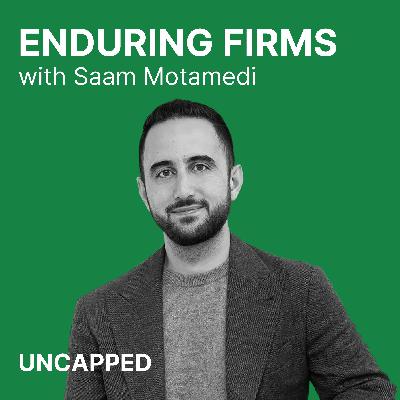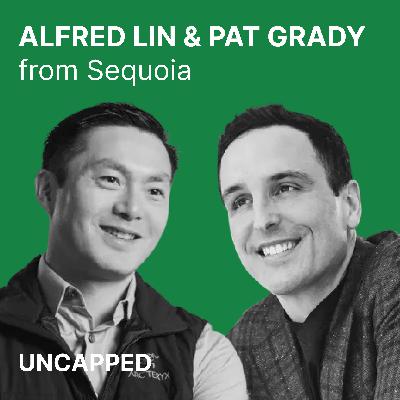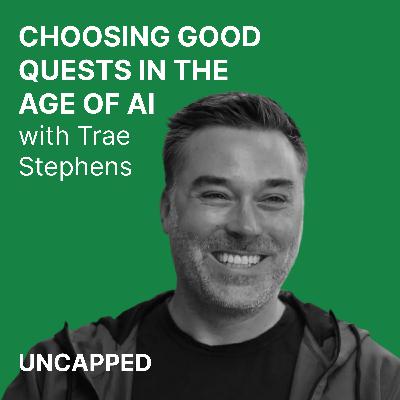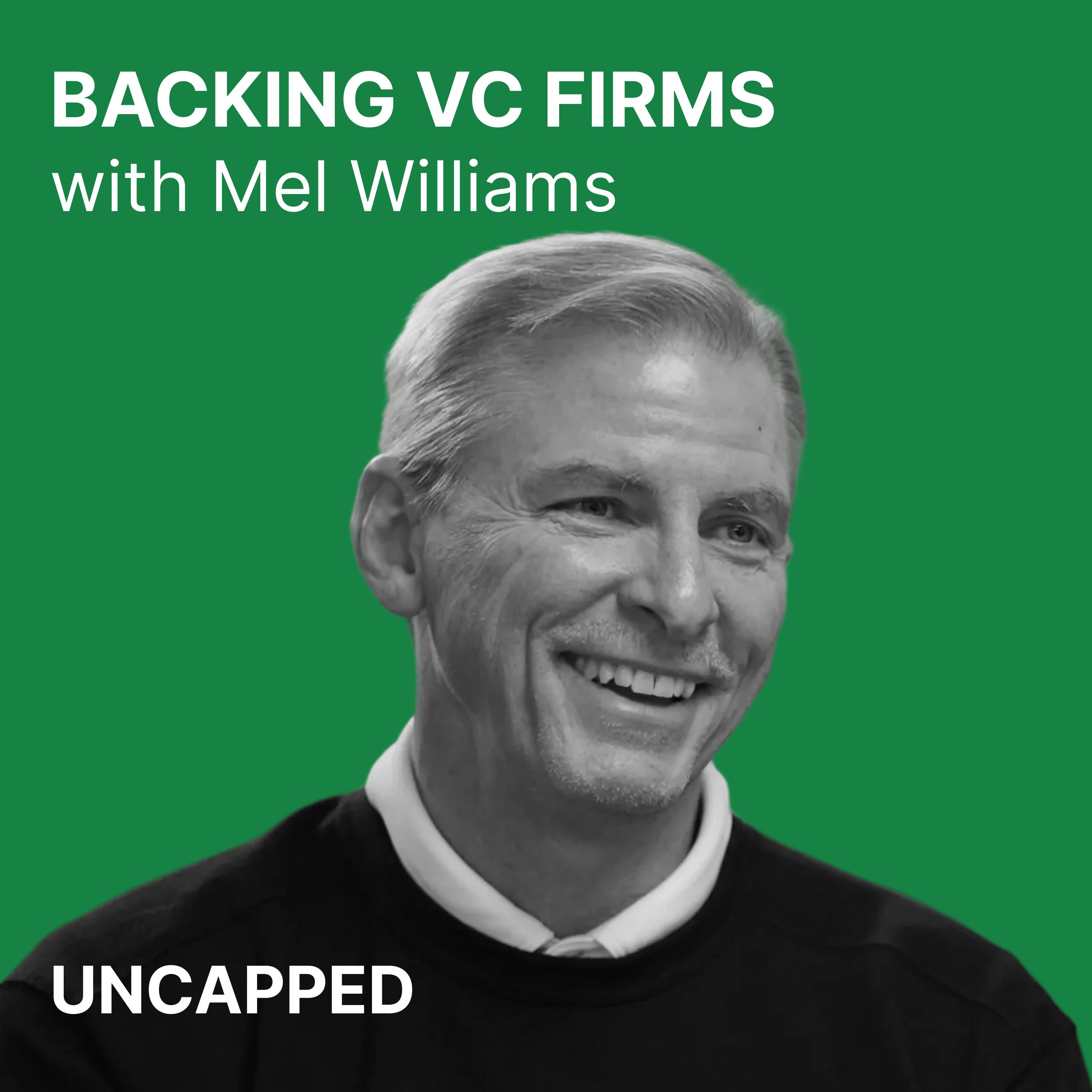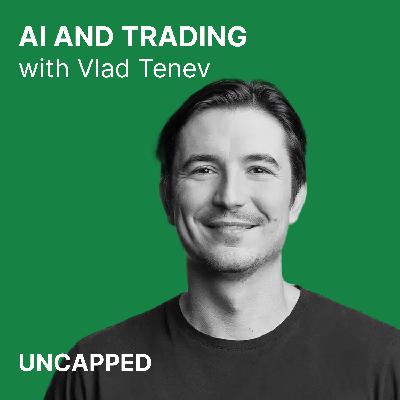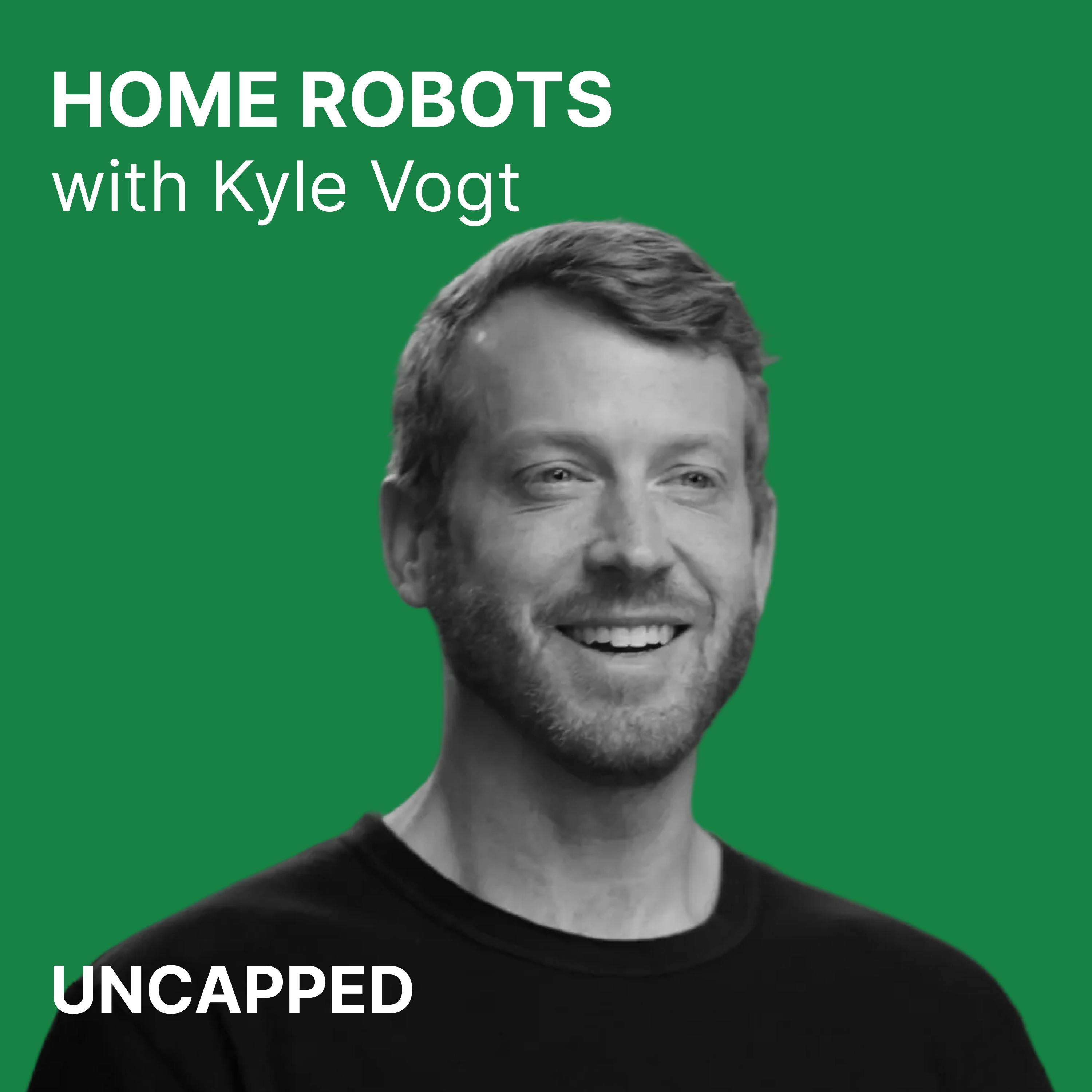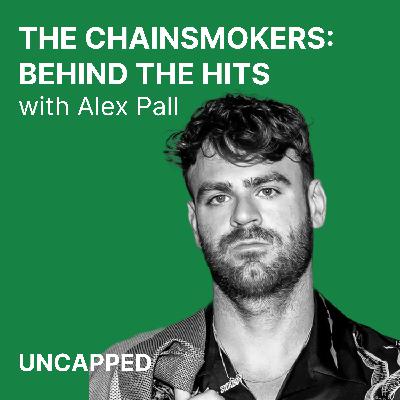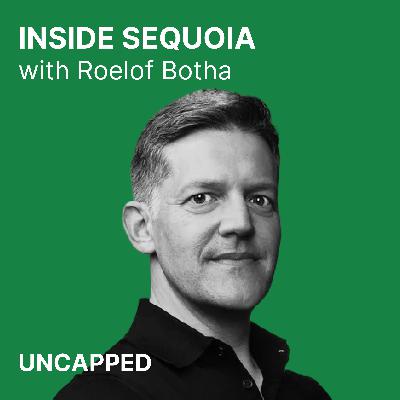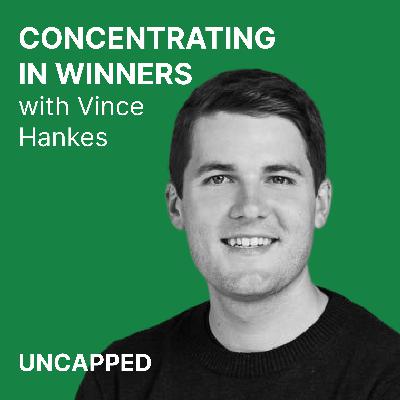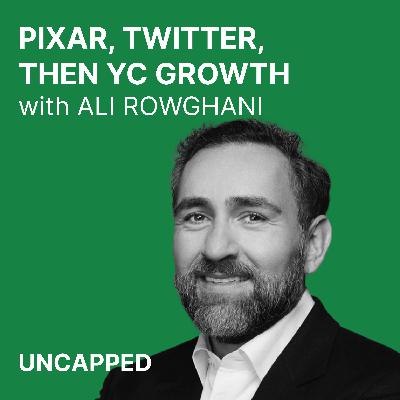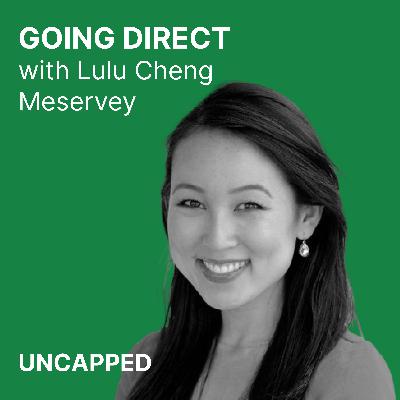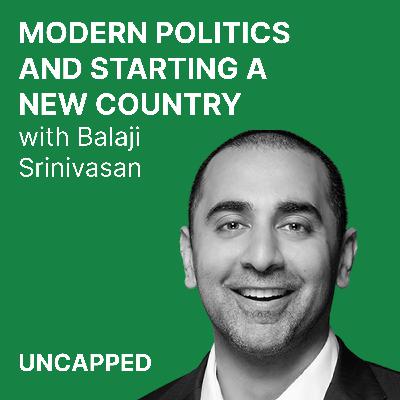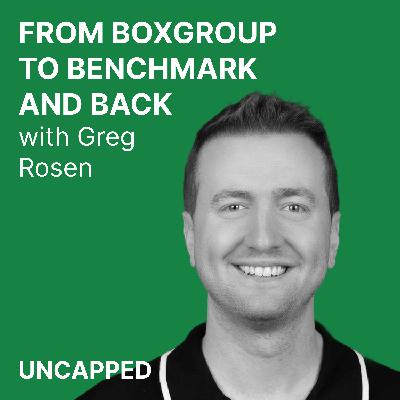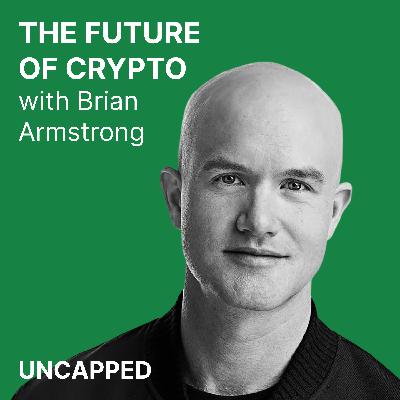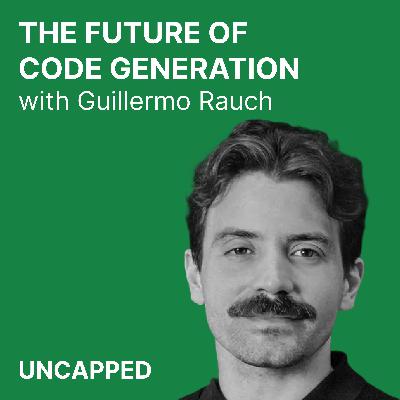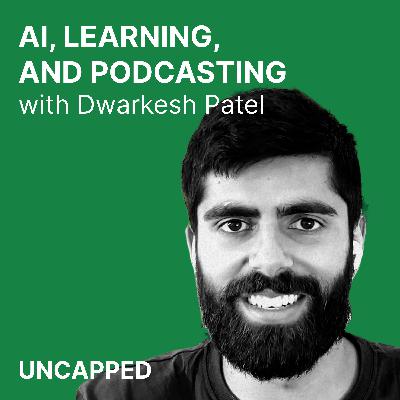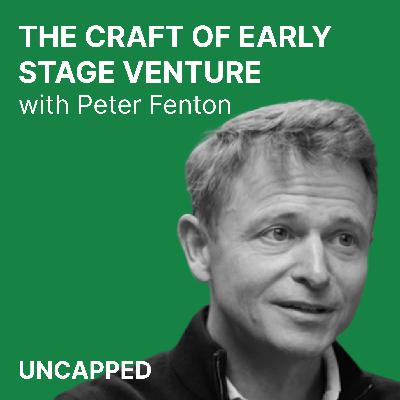Discover Uncapped with Jack Altman
Uncapped with Jack Altman

37 Episodes
Reverse
Saam Motamedi is a General Partner at Greylock Partners working with enterprise software entrepreneurs at the seed and early stages who are focused on new opportunities in intelligent applications, cybersecurity, AI, and data infrastructure. In 2019 at just 26 years old, Saam became the Greylock’s youngest General Partner in its 54-year history – a remarkable achievement at an institution that had backed Airbnb, AppDynamics, Coinbase, Discord, Figma, Instagram, LinkedIn, among others.
Saam’s portfolio spans 14+ companies with collective valuations exceeding $10 billion. Abnormal Security, which Greylock incubated in its offices in 2018 with Saam as founding investor, grew into a multi-billion-dollar email security powerhouse. Cresta, where he led the Series A in 2019, became the leading generative AI platform for contact centers. Snorkel AI, Braintrust, Orb, and a portfolio of other infrastructure companies position Saam at the center of AI's business model transformation.
We covered:
Durable components to great firms
Inside look at how Greylock operates
Cracking the code on incubations
Alpha in today’s venture strategies
---
Timestamps:
(0:00) Intro
(1:32) Greylock turning 60 this year
(4:11) What’s persisted since 1965
(8:59) Apprenticeship
(11:34) What's durable in venture
(16:29) Greylock’s ethos
(19:33) Incentive misalignments
(24:44) Breadth vs depth in venture
(29:28) Managing the team on inputs
(34:00) Why incubations are so hard
(43:22) Finding alpha
(52:38) Greylock’s approach to portfolio services
(59:18) Assessing wild revenue ramps
(1:08:10) Horizontal vs vertical SaaS
(1:11:34) Friendships and work
(1:16:26) Saam's biological age
---
More on Saam:
https://greylock.com/
https://x.com/saammotamedi
More on Jack:
https://www.altcap.com/
https://x.com/jaltma
---
https://linktr.ee/uncappedpod
Email: friends@uncappedpod.com
Pat Grady and Alfred Lin are partners at Sequoia and were recently named as the storied firm’s new co-stewards. Alfred joined the firm in 2010, where he has led major investments into category-defining companies like Airbnb, DoorDash, and Kalshi. Pat has been a partner at the firm for nearly 19 years and has led Sequoia’s growth-stage investing since 2015, backing companies like Snowflake, OpenAI, and Harvey. In this episode, we unpack how Sequoia actually works: their partnership model, how they pick outliers, and what stewardship means inside one of the most respected firms in venture capital.
Some highlights:
Consensus doesn’t matter, conviction does
Freedom within frameworks: see, pick, win, help, harvest
Mid-funnel decisions are the most important
The two fears that lead to bad decisions
To do this business well, you need courage
---
Timestamps:
(0:00) Intro
(1:01) Initial mindset as stewards
(4:30) The business of outliers
(6:27) Managing the inputs in venture
(12:11) Sourcing coverage goals
(17:57) Seeing the right companies
(22:36) Proprietary map of talent
(24:39) The impact of great engineers
(29:06) Picking winners with conviction
(36:26) Coaching asymmetry into picking
(43:16) Mentoring younger investors
(46:45) Frameworks on picking
(53:20) What it takes to win
(58:32) How to onboard with a founder
(1:02:59) Proudest board seats
(1:06:12) 2026 in the new roles
---
More on Pat & Alfred:
https://sequoiacap.com/
https://x.com/gradypb
https://x.com/Alfred_Lin
More on Jack:
https://www.altcap.com/
https://x.com/jaltma
---
https://linktr.ee/uncappedpod
Email: friends@uncappedpod.com
Trae Stephens is a Partner at Founders Fund. He is also Co-founder and Executive Chairman of Anduril, a defense tech company focused on autonomous systems, and Co-founder of Sol, a next generation wearable e-reader. Previously, Trae was an early employee at Palantir Technologies, where he led teams focused on growth in the intelligence/defense space as well as international expansion. He was also an integral part of the product team, leading the design and strategy for new product offerings.
Prior to Palantir, Trae worked as a computational linguist building enterprise solutions to Arabic/Persian name matching and data enrichment within the United States Intelligence community. He began his career working in the office of then Congressman Rob Portman and in the Political Affairs Office at the Embassy of Afghanistan in Washington, D.C. immediately following the installation of Hamid Karzai’s transitional government.
We covered:
Hard tech and the future of warfare
AI morality and “good quests”
How Anduril scales manufacturing
Founders Fund’s investing philosophy
Contrarianism and concentration
The ethics of autonomy and national defense
---
Timestamps:
(0:00) Intro
(0:35) Choosing good quests in the AI era
(7:35) Ethics behind solving certain problems
(11:29) Working with regulators
(16:54) What’s left to prove at Anduril
(18:32) Anduril, SpaceX, and Tesla at scale
(22:30) The future of warfare
(24:48) Juggling Anduril and Founders Fund
(29:07) A system that rewards going deep
(31:21) What’s made Founders Fund great
(37:30) The king-making strategy in VC
(40:26) Concentrating in the winners
(43:55) Where there’s alpha in the market
(47:22) Theological revival in traditional faith
---
More on Trae:
https://foundersfund.com/
https://x.com/traestephens
More on Jack:
https://www.altcap.com/
https://x.com/jaltma
---
https://linktr.ee/uncappedpod
Email: friends@uncappedpod.com
Mel Williams is a co-founder and Partner at TrueBridge Capital Partners, a fund of funds with $8 billion in AUM focused on venture capital. Since 2007, Mel’s team has backed firms like Thrive, Founders Fund, Sequoia, and Alt Capital, and powers the data behind the Forbes Midas List. Before TrueBridge, Mel co-founded UNC Management Company (UNCMC), where he worked closely with the President/CIO to manage over $2 billion of endowment capital for the University of North Carolina.
We covered:
Investing in frothy markets
Doubling down on winners
Seed vs multi-stage
Picking managers
---
Timestamps:
(0:00) Intro
(1:10) AI valuations and a frothy market
(4:35) Long term market risks
(7:18) Should VC funds keep getting bigger?
(9:37) 10% of the market is the signal
(14:08) Venture math debate
(18:05) Characteristics of great investors
(20:46) The case for seed stage firms
(23:09) Picking managers
(24:59) Big wins and big misses
(30:12) It’s hard to kill a good brand
(33:06) Building a concentrated portfolio
(36:53) Advice to young LPs
---
More on Mel:
https://truebridgecapital.com/
https://truebridgecapital.com/team/mel-williams/
More on Jack:
https://www.altcap.com/
https://x.com/jaltma
---
https://linktr.ee/uncappedpod
Email: friends@uncappedpod.com
Vlad Tenev is the co-founder and CEO of Robinhood (NASDAQ: HOOD), which transformed financial services by introducing commission-free stock trading and democratizing access to the markets for millions of investors. As of Q3 2025, the company is doing $1.27 billion in revenue with 11 business lines each doing roughly $100 million.
We discuss the evolution of online brokerage platforms from Schwab to E-Trade to now Robinhood. Vlad delves into the launch of Robinhood, the impact of the global financial crisis, and how mobile and high-frequency trading have transformed finance. The conversation explores the rise and success of prediction markets, the importance of engaging younger generations, and how AI is enhancing the future of trading.
---
Timestamps:
(0:00) Intro
(00:27) History of online brokers
(4:15) The rise of Robinhood
(9:15) Changing sentiment among generations
(14:18) Incentive alignment with customers
(18:47) The emergence of prediction markets
(25:50) Economic value vs entertainment
(28:26) Growing degree of risk taking
(35:21) Tokenization and private markets
(39:33) The impact of AI on Robinhood
(43:35) What excites Vlad about AI
(46:59) Reflections on being a founder
---
More on Vlad:
https://robinhood.com/us/en/
https://x.com/vladtenev
More on Jack:
https://www.altcap.com/
https://x.com/jaltma
---
https://linktr.ee/uncappedpod
Email: friends@uncappedpod.com
Kyle Vogt is a serial entrepreneur and engineer often recognized as the co-founder and former CEO of Cruise, the autonomous vehicle company acquired by General Motors for $1 billion. Before Cruise, he co-founded Twitch, which transformed how people watch and share gaming online. Kyle is now building a new company at the frontier of intelligent home automation, aiming to bring advanced robotics into everyday life.
A few highlights:
Labs beginning to see their ChatGPT moment
Most robots will be specialized, not humanoids
Robots will be cooking steaks in less than 5 yrs
Indefinitely operating with less than 100 people
Running a marathon on every continent in 81+ hrs
---
Timestamps:
(0:00) Introduction
(0:34) Why robotics is suddenly booming
(1:48) AI unlocking the next wave
(3:31) Special-purpose vs generalized
(5:32) Designing robots people actually use
(9:00) Building for scale, impact, and affordability
(12:17) The myth of the humanoid robot
(15:04) Trust, safety, and privacy in your home
(17:51) The data powering robotics intelligence
(21:01) Why Kyle keeps starting hard companies
(22:32) The 100-person rule and elite teams
(26:10) How to move fast and actually ship
(27:28) What home robotics will do first
(35:05) Home security applications
(37:07) Robots should elevate our standard of living
(38:41) Lessons from Tesla vs Waymo
(41:08) Thoughts on when to sell the company
(42:41) Running marathons on every continent
---
More on Kyle:
https://www.bot.co/
https://x.com/kvogt
More on Jack:
https://www.altcap.com/
https://x.com/jaltma
---
https://linktr.ee/uncappedpod
Email: friends@uncappedpod.com
Dylan Field is the co-founder and CEO of Figma, a design software company that went public in July 2025. Founded in 2012, Figma transformed how people design, prototype, and build products together. After a $20 billion acquisition attempt by Adobe collapsed in 2022 because of regulators, Dylan helped Figma rebound stronger than ever. Just three years later, Figma listed its shares at nearly $20 billion and its stock price more than tripled on its first trading day.
A few highlights:
Expanding a sleepy market
Merging of designers and product roles
Counter-narrative to polarizing CEOs
If models get better, we have to
Remembering Brat Summer
---
Timestamps:
(0:00) Intro
(0:37) The first 5 years of Figma
(5:14) Slow build vs AI gold rush
(13:01) The role of the human designer
(18:55) Small companies with $1B in revenue
(21:28) Expanding a sleepy market
(27:49) Leading with empathy as CEO
(32:51) Connecting with young people
(41:37) Getting stronger despite Adobe
(48:43) AI impacting Figma’s roadmap
(52:02) Final bastion of human designers
---
More on Dylan:
https://www.figma.com/
https://x.com/zoink
More on Jack:
https://www.altcap.com/
https://x.com/jaltma
---
https://linktr.ee/uncappedpod
Email: friends@uncappedpod.com
Alex Pall is half of the Grammy Award-winning duo The Chainsmokers. Beyond music, Alex is entrepreneur and co-founder of Mantis VC, a venture firm that invests opportunistically in early stage tech-enabled startups. Some of their investments include Alchemy, Chainguard, Kalshi, Roblox, and Rogo. We had a wide ranging conversation that broke down the creative stories behind a few of their top hits including “Closer,” “Something Just Like This,” and “Don’t Let Me Down.” We also explored the creative process at the highest level and how Alex’s experience in music influences the way he approaches venture investing.
---
Timestamps:
(0:00) Intro
(1:04) Stories behind the songs
(4:58) Coldplay collaboration
(9:57) Creating Closer
(13:25) Dependencies vs creative fuel
(18:09) Letting songs be promiscuous
(19:45) How “Don’t Let Me Down” happened
(22:57) Art vs playing the favorites
(26:18) Balancing music and business
(29:49) Albums telling stories
(35:42) Tension behind growth as an artist
(39:28) Inspiration drives creativity
(41:20) AIs impact on music
(44:34) Outlier talent
(47:22) Building a venture firm
(54:46) Experiencing elite circles
(1:01:17) Importance of momentum
---
More on Alex:
https://www.mantisvc.com/
https://x.com/AlexPallNY
More on Jack:
https://www.altcap.com/
https://x.com/jaltma
---
https://linktr.ee/uncappedpod
Email: friends@uncappedpod.com
Thomas Laffont is the co-founder of Coatue, one of the world’s largest technology investment platforms active in both the public and private markets. Thomas leads the firm’s private investment platforms across early-stage and growth, and oversees their software investments across private and public markets. Coatue has partnered with some of the most enduring and impactful companies of the last two decades, including Applied Intuition, Canva, Databricks, Figma and Rippling. Thomas began his career at the Creative Arts Agency, where he represented artists in film and television.
A few highlights:
The system of record being over
Wanting to be a founder’s second call
Investing with a wide aperture
Tom Cruise validating star quality
Working with family
---
Timestamps:
(0:00) Intro
(0:25) Making sense of the current cycle
(5:31) Investing from inception through IPO
(10:36) Depreciation of the system of record
(14:04) Value beyond databases
(18:46) Winning strategies in venture
(23:43) Operating at early-stage
(28:56) Navigating investing conflicts
(34:29) Wide aperture lens of investing
(36:45) Star quality being a reality
(40:30) Firm strategy and decision making
(48:25) Everything that’s great about golf
(54:34) Working with family
(57:20) Advice to young professionals
---
More on Thomas:
https://www.coatue.com/
https://x.com/thomas_coatue
More on Jack:
https://www.altcap.com/
https://x.com/jaltma
---
https://linktr.ee/uncappedpod
Email: friends@uncappedpod.com
Roelof Botha joined Sequoia in 2003 and serves as the managing partner and steward. Roelof led early investments in YouTube, Instagram, Natera, and MongoDB among others. He currently sits on the board of Natera, Unity, Block (fka Square), MongoDB, Ethos, Pendulum, Airtime, and Flow Engineering. Roelof also co-led Sequoia’s backing of Elon Musk’s acquisition of Twitter (now X) in 2022. Prior to Sequoia, Roelof was the CFO of PayPal and led the company’s IPO at the age of 28, and later through its acquisition by eBay.
We covered:
Paranoia that drives success
Venture not being an asset class
Full contact conversations
Cost being the secret to Silicon Valley
The next trillion dollar markets
---
Timestamps:
(0:00) Intro
(0:52) Becoming the steward
(5:16) Keeping healthy paranoia
(9:26) Drivers of joy as a leader
(11:17) Current venture playing field
(13:38) Venture is not an asset class
(18:50) Advice to new managers
(19:47) Decision making at Sequoia
(30:11) Investing across stages
(37:12) Component of cost
(46:57) Conflicting investments
(50:48) The next trillion dollar markets
(59:30) Team building
---
More on Roelof:
https://x.com/roelofbotha
https://www.sequoiacap.com/people/roelof-botha/
More on Jack:
https://www.altcap.com/
https://x.com/jaltma
---
https://linktr.ee/uncappedpod
Email: friends@uncappedpod.com
---
This episode is presented for informational purposes only and does not constitute investment advice or an offer to sell, or a solicitation of an offer to buy, any securities. The discussion herein similarly does not constitute a solicitation with respect to any Sequoia fund or an offer of investment advisory services. Investments identified herein are discussed solely for illustrative purposes and there is no guarantee that current or future investments of Sequoia will be similar in quality or kind.
Vince Hankes is a Partner at Thrive Capital where he’s worked on investments in OpenAI, SpaceX, Databricks, and Stripe among others. Vince invests across all stages and currently sits on the board of Airtable, Benchling, Console, Isomorphic, Lattice and Rogo. Prior to joining Thrive, Vince was an investor at Tiger Global.
We covered:
Non-consensus investing
Writing billion dollar checks
Buying Carvana at the bottom
The value of compounding
What matters most to Thrive
---
Timestamps:
(0:00) Intro
(0:50) The evolution of Thrive
(4:22) Instagram, Github, and Stripe
(7:57) Qualitative, then quantitative
(9:39) Writing massive checks
(16:48) Winning strategies in venture
(25:58) Buying Carvana at the bottom
(32:50) Managing conflicts
(36:13) AI’s impact on the market
(42:25) East meets West Coast investors
(45:19) Vertical specific workspaces
(49:53) Scale and timing of robotics
(51:31) OpenAI vs everything else
(55:59) What matters most for Thrive
---
More on Vince:
https://x.com/vhankes
https://www.linkedin.com/in/vincent-hankes/
More on Jack:
https://www.altcap.com/
https://x.com/jaltma
---
https://linktr.ee/uncappedpod
Email: friends@uncappedpod.com
---
This episode is presented for informational purposes only and does not constitute investment advice or an offer to sell, or a solicitation of an offer to buy, any securities. The discussion herein similarly does not constitute a solicitation with respect to any Thrive fund or an offer of investment advisory services. Investments identified herein are discussed solely for illustrative purposes and there is no guarantee that current or future investments of Thrive will be similar in quality or kind.
Ali Rowghani is the founder of First Harmonic, a go-to-market program purpose-built for seed stage founders.
Ali has had a long, distinguished career in tech. He worked with Steve Jobs and Ed Catmull at Pixar for nine years holding various roles including CFO and SVP of Strategic Planning, took Twitter from $0 in revenue through IPO as the CFO and COO, and most recently was the founding Managing Director of Y Combinator’s Continuity Fund where he led investments in DoorDash, Stripe, Coinbase, Zapier, among many others. Ali has also invested as an early angel in several breakout AI companies, including Mercor, Decagon, and Cursor. He’s seen the arc from inception to IPO many times and recognizes what separates winning startups from the pack.
We covered:
Pixar’s golden age
Exceptional leadership
Working with Steve Jobs
Twitter going from $0 to $2B
Operating beliefs in venture
---
Timestamps:
(0:00) Intro
(0:53) Pixar’s miracle factory
(6:28) Working with Steve Jobs
(13:23) Ed Catmull and John Lasseter
(16:28) Crazy years at Twitter
(18:30) Getting monetization right
(19:56) Learnings in hindsight
(22:37) Elon Musk observations
(24:03) Beginning of YC’s growth fund
(29:31) Between pre and post traction
(33:23) The second job of a CEO
(34:35) First Harmonic
(35:31) Beliefs in venture
---
More on Ali:
https://www.firstharmonic.com/
https://x.com/ROWGHANI
More on Jack:
https://www.altcap.com/
https://x.com/jaltma
---
Link to Ali’s referenced blog post:
https://www.ycombinator.com/library/3k-the-second-job-of-a-startup-ceo
---
https://linktr.ee/uncappedpod
Email: friends@uncappedpod.com
Lulu Cheng Meservey is the leading voice in the new age of PR and comms and is the founder of Rostra, an advisory firm helping founders go direct.
Lulu has been a trusted voice for founders like Palmer Luckey at Anduril, Eric Glyman at Ramp, and Brian Armstrong at Coinbase. She previously ran corporate affairs and communications for Activision Blizzard and was the head of comms for Substack.
Lulu writes an acclaimed newsletter called Flack, where she proposes her new playbook for communications and shares tactical advice for how to help win over the people who matter, without wasting time or inducing cringe.
A few memorable moments:
Aura is code for good communicator
People like to have assumptions for the level of celebration you deserve
The correct version of this company has him in it
Words that mean the same thing aren’t perceived the same way
Comms is the last thing to be uniquely human
---
Timestamps:
(0:00) Intro
(0:50) Comms having a moment
(3:43) Breaking through the noise
(6:30) What makes a great story
(9:58) Creating story arcs
(17:29) Flow and stock
(20:29) All press is good press
(23:25) Leaning into authenticity
(28:10) Word choice
(35:09) Impact on recruiting
(42:48) The business of comms
(45:48) Comms predictions
(48:18) Tech & media relationship
---
More on Lulu:
https://x.com/lulumeservey
https://www.getflack.com/
https://rostra.co/
More on Jack:
https://www.altcap.com/
https://x.com/jaltma
---
https://linktr.ee/uncappedpod
Email: friends@uncappedpod.com
Balaji Srinivasan is an angel investor, tech founder, and WSJ bestselling author of The Network State. He is currently the founder of The Network School, a frontier community for techno-optimists.
Formerly the CTO of Coinbase and General Partner at Andreessen Horowitz, he is an early investor in many successful tech companies, including Anduril, Perplexity, OpenSea, Alchemy, StarkWare, Dapper Labs, Benchling, and Polymarket to name a few. Balaji also led the launch of USDC as Coinbase CTO, and was an early investor in many important crypto protocols including Bitcoin, Ethereum, and Solana among others.
In this conversation, we discuss the evolving political landscape, emphasizing the disruptions caused by technology and the internet. Balaji outlines the four factions in the current political climate: the internet, Blue America, Red America, and China. We also explore the implications of tariffs, the rise of AI, and the future of network states.
---
Timestamps:
(0:00) Intro
(0:19) The Network School
(1:24) Mapping the political landscape
(3:38) Tech and the media
(6:19) China and the trade war
(11:32) Tariffs and economic strategy
(24:30) Global economic shifts
(27:41) Rise of the global anti-woke coalition
(31:11) Unholy alliances that might form
(37:18) Class warfare instead of race warfare
(41:21) The answer may not be in America
(46:56) The Network State
---
More on Balaji:
https://x.com/balajis
https://ns.com/
https://thenetworkstate.com/
More on Jack:
https://x.com/jaltma
https://www.altcap.com/
---
https://linktr.ee/uncappedpod
Email: friends@uncappedpod.com
Martin Casado is a general partner at a16z, where he leads the firm’s $1.25 billion infrastructure practice. Martin has led investments in Cursor, dbt Labs, and Fivetran to name a few. Prior to joining a16z in 2016, he was the co-founder and CTO of Nicira, which was acquired by VMware for $1.26B. While at VMware, Martin was the SVP and GM of network and security, which he scaled to a $600 million run-rate business. Martin started his career at Lawrence Livermore National Laboratory where he worked on large-scale simulations for the Department of Defense before moving over to work with the intelligence community on networking and cybersecurity.
We covered:
What necessitates specialization
The conflicts dynamic
Infra vs app companies
Importance of open source
The only sin in VC
---
Timestamps:
(0:00) Intro
(0:27) Importance of media for VC
(3:50) Evolution of a16z
(7:00) Specialization
(10:32) Value of distribution
(13:16) Staying power in infra
(19:49) The conflicts dynamic
(26:32) State of play in AI
(30:48) The future of coding
(34:58) Significance of open source
(39:48) Marc Andreessen’s leadership
(44:02) The only sin in VC
(48:37) Scaling a lot of board seats
---
More on Martin:
https://a16z.com/author/martin-casado/
https://x.com/martin_casado
More on Jack:
https://www.altcap.com/
https://x.com/jaltma
---
https://linktr.ee/uncappedpod
Email: friends@uncappedpod.com
Greg Rosen is a Partner at BoxGroup. Greg was the first hire at BoxGroup outside of the founders, David Tisch and Adam Rothenberg. After moving to the West Coast to work with Benchmark and Bedrock, Greg rejoined BoxGroup and currently invests out of their San Francisco office. An engineer by training, Greg built iOS games in high school before dropping out of college at 19 to join Jim Pallotta's venture fund in New York City.
BoxGroup is an NYC-based seed stage venture capital firm that has invested in over 500 seed-stage startups over the last 15 years, including Plaid, Ro, Ramp, Clay, Scopely, Warp, Cursor, PillPack, Amplitude, Flatiron Health, Stripe, Warby Parker, Harry’s, Oscar, Flexport, Classpass, Vine, GroupMe, Airtable and more.
We covered:
Being collaborative at scale
Avoiding adverse selection
Getting to a yes instead of no
Venture calendar audits
Running the right strategy
---
Timestamps:
(0:00) Intro
(0:47) The collaborative venture model
(5:47) Adverse selection vs coverage
(11:59) How to see a ton of companies
(14:44) Getting to founders early
(21:10) Helping teammates get to a yes
(23:25) Why there aren’t more BoxGroups
(27:57) What’s learnable about picking
(31:46) Calendar auditing
(34:39) Focusing on where you’re outlier
(37:25) Depth vs breadth of network
(41:03) The future of code
(44:00) Brain computers
---
More on Greg:
https://www.boxgroup.com/
https://x.com/grosen
More on Jack:
https://www.altcap.com/
https://x.com/jaltma
---
https://linktr.ee/uncappedpod
Email: friends@uncappedpod.com
Brian Armstrong is the co-founder and CEO of Coinbase, a leading cryptocurrency company that provides exchange, brokerage, and custody services to 100M+ verified users in over 100 countries. Founded in 2012, Coinbase went public in 2021 on the NASDAQ under the ticker COIN and as of August 2025 has a market cap of $83 billion. Brian is also the co-founder of New Limit, a longevity biotech company on a mission to significantly extend human lifespan that recently raised a $130M Series B led by Kleiner Perkins and angels including John and Patrick Collison, Elad Gil, and Joshua Kushner, among others.
We covered:
Working with the government
When to jump to the hot new thing
Choosing what frontiers to prioritize
The inner game of being contrarian
---
Timestamps:
(0:00) Intro
(0:26) Becoming the everything chain
(4:20) Story behind the GENIUS Act
(5:33) Working with regulators
(10:45) The future of crypto and the government
(17:10) When to jump to the hot new thing
(23:03) Choosing what frontiers to prioritize
(29:59) Brain-computer interface tech
(34:48) Inside the mind of a contrarian
(43:52) Creating a sustainable lifestyle
---
More on Brian:
https://www.coinbase.com/
https://www.newlimit.com/
https://x.com/brian_armstrong
More on Jack:
https://www.altcap.com/
https://x.com/jaltma
---
https://linktr.ee/uncappedpod
Email: friends@uncappedpod.com
Guillermo Rauch is the founder and CEO of Vercel, creators of v0 which is one of the most popular AI app building tools that’s helping power the online presence of companies like Porsche, Under Armour and Nintendo. In May 2024, Vercel completed a $250M Series E at a $3.25B valuation and was recently named to the Forbes Cloud 100. Originally from Argentina, Guillermo became a self-taught developer at the age of ten, and has been a passionate contributor to the open-source community ever since. He is the mind behind foundational JavaScript frameworks like Next.js and Socket.io, and has built tools that power some of the internet’s most innovative products, including Midjourney, Grok, and Notion.
We covered:
Vercel’s early insights
State of affairs for codegen
Implications of AI for developers
Skills of the future
Product building taste
---
Timestamps:
(0:00) Intro
(0:28) Prequel to Vercel
(4:32) Vercel’s early insights
(8:13) State of affairs for codegen
(17:18) Codegen evolution
(19:37) Perceived vs realized productivity
(27:53) Fault attribution
(31:56) Internet being a house of cards
(35:33) When codegen will be exceptional
(40:18) What kids should be learning
(47:42) Chasing the dragon vs listening to customers
(50:46) The next internet
(51:58) Reverse engineering success
(55:50) Making it work as a dad and CEO
(58:14) Taste in building product
---
More on Guillermo:
https://vercel.com/
https://x.com/rauchg
More on Jack:
https://www.altcap.com/
https://x.com/jaltma
---
https://linktr.ee/uncappedpod
Email: friends@uncappedpod.com
In his early twenties, Dwarkesh Patel has become one of the leading podcasters with nearly 1 million YouTube subscribers excited to consume his deeply-researched interviews. Dwarkesh has caught the attention of influential figures such as Jeff Bezos, Noah Smith, Nat Friedman, and Tyler Cohen, who have all praised his interviews – the latter describing him as “highly rated but still underrated.” In 2024, he was included in TIME’s 100 most influential people in AI alongside the likes of Ilya Sutskever, Andrew Yao, and Albert Gu. Dwarkesh’s interviews span far beyond AI, his North Star being his curiosity and preparation.
We covered:
Digital minds leading huge companies
AI making us smarter vs rotting our brain
His approach to learning as his job
Best in class interview preparation
---
Timestamps:
(0:00) Intro
(0:23) Skepticism around the timing of AGI
(6:07) Confidence in AI researchers
(7:17) Future utility of superintelligence
(11:23) Impact of scaling digital minds
(15:41) Driven by increases in compute
(17:17) Is AI making us smarter?
(21:03) AI’s impact on biology
(23:54) Interests outside of AI
(26:18) Chronology of his interests
(31:10) His approach to learning
(33:43) New thinking on human evolution
(40:44) Learning and the media
(45:52) Podcasting success
(48:53) Best in class interview preparation
---
More on Dwarkesh:
https://www.dwarkesh.com/
https://x.com/dwarkesh_sp
More on Jack:
https://www.altcap.com/
https://x.com/jaltma
---
https://linktr.ee/uncappedpod
Email: friends@uncappedpod.com
Peter Fenton is the longest-serving full-time partner at Benchmark, a renowned venture firm known for its artisanal approach and deep alignment with founders. Over the last two decades, Peter led investments in Twitter, Yelp, Elastic, Docker, Zuora, and many others. He also achieved one of the rarest feats in venture history in 2014 when two of his investments, Hortonworks and New Relic, went public on the same day. More recent investments include Sierra, Ollama, ClickHouse, and Airtable. Peter is considered one of the most successful tech investors of our time and is an incredible person to learn from.
We covered:
Darwinism and Silicon Valley
Who wins as a result of AI
Embracing things that don’t scale
Sourcing and winning motions
Being a great board member
---
Timestamps:
(0:00) Intro
(0:23) Darwinism and Silicon Valley
(5:38) Silicon Valley vs everywhere else
(12:09) Highly adaptive ecosystems
(19:40) Who wins with AI
(26:22) Applying Darwinism to venture
(36:54) North Stars in venture
(42:22) Embracing things that don’t scale
(49:51) A young person’s game
(57:10) Sourcing methodologies
(1:07:50) Convincing founders to choose you
(1:10:56) Not a winner-take-all game
(1:13:35) Being a great board member
---
More on Benchmark and Peter:
https://www.benchmark.com/
https://x.com/peterfenton
More on Alt Capital and Jack:
https://www.altcap.com/
https://x.com/jaltma
---
https://linktr.ee/uncappedpod
Email: friends@uncappedpod.com


